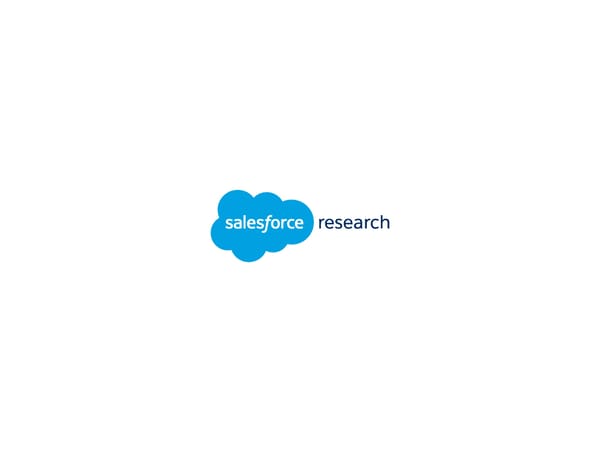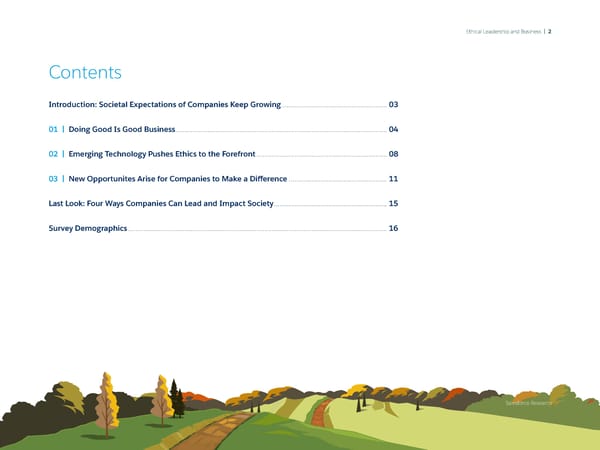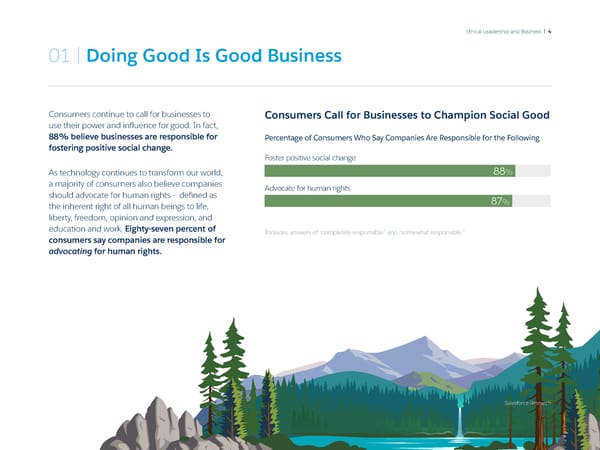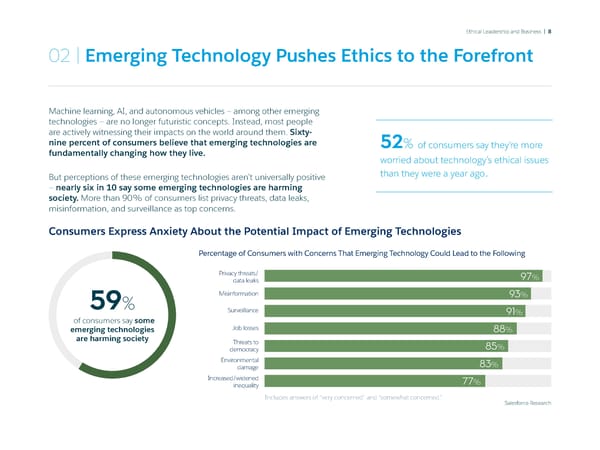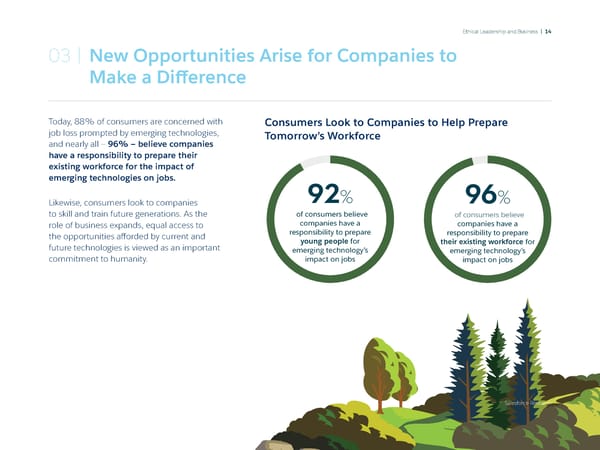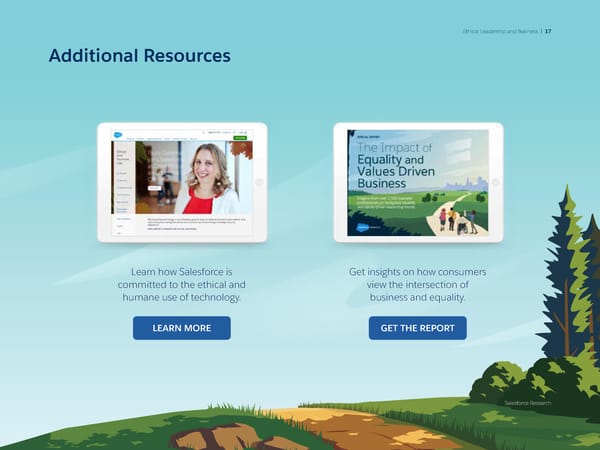Ethical Leadership and Business
SPECIAL REPORT | 17 pages
SPECIAL REPORT Ethical Leadership and Business 2,400+ consumers share insights on technology, equality, and ethics in the Fourth Industrial Revolution
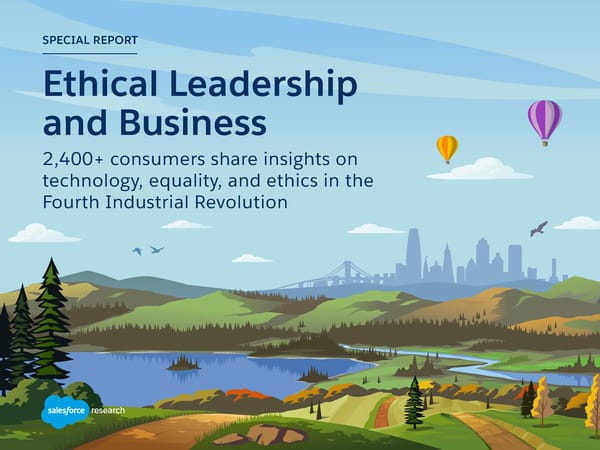
Ethical Leadership and Business | 1 About This Report For this special report, “Ethical Leadership and Business,” Salesforce Research surveyed more than 2,400 consumers to determine: • Attitudes toward emerging technology and its impacts on society • The role of business in society as the Fourth Industrial Revolution progresses • How business ethics impacts customer loyalty Data in this report is from a double-blind survey conducted in October 2018 that generated 2,401 responses from consumers in the United States. All respondents are third-party panelists. For further survey demographics, see page 17. Due to rounding, not all percentage totals in this report equal 100%. All comparison calculations are made from total numbers (not rounded numbers). Salesforce Research provides data-driven insights to help businesses transform how they drive customer success. Browse all reports at salesforce.com/research. SalesforSalesforcce Re Researesearchch
Ethical Leadership and Business | 2 Contents Introduction: Societal Expectations of Companies Keep Growing ........................................................ 03 01 | Doing Good Is Good Business ................................................................................................................ 04 02 | Emerging Technology Pushes Ethics to the Forefront ..................................................................... 08 03 | New Opportunites Arise for Companies to Make a Difference .................................................... 11 Last Look: Four Ways Companies Can Lead and Impact Society ............................................................ 15 Survey Demographics ......................................................................................................................................... 16 SalesforSalesforcce Re Researesearchch
Ethical Leadership and Business | 3 Introduction Societal Expectations of Companies Keep Growing Society as we know it is at a critical inflection Consumers See a Higher Calling for Businesses point. We are in the midst of the Fourth Industrial Revolution — a time of unprecedented innovation that is fundamentally changing the way we communicate, learn, work, and live. Amid this change, consumer expectations of the 90% 93% societal responsibility of businesses keep growing. Today 93% of consumers say companies have of consumers say companies of consumers say companies a responsibility to look beyond profit and make have a responsibility to have a responsibility to look a positive impact on the world — up from 80% improve the state beyond profit to positively of the world impact society in 2016.* Ninety percent of consumers say companies have a responsibility to improve the state of the world. In other words, in the midst of technological transformation, companies are being held accountable for more than the bottom line — today more even than in years past. * In 2016, respondents were asked to what extent companies have this responsibility. In 2018, respondents were asked the degree to which companies have this responsibility. SalesforSalesforcce Re Researesearchch
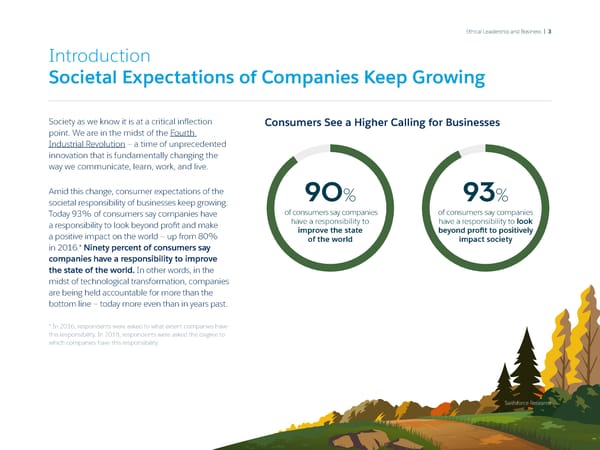

Ethical Leadership and Business | 4 01 | Doing Good Is Good Business Consumers continue to call for businesses to Consumers Call for Businesses to Champion Social Good use their power and influence for good. In fact, 88% believe businesses are responsible for Percentage of Consumers Who Say Companies Are Responsible for the Following fostering positive social change. Foster positive social change As technology continues to transform our world, 88% a majority of consumers also believe companies Advocate for human rights should advocate for human rights — defined as 87% the inherent right of all human beings to life, liberty, freedom, opinion and expression, and education and work. Eighty-seven percent of Includes answers of “completely responsible” and “somewhat responsible.” consumers say companies are responsible for advocating for human rights. SalesforSalesforcce Re Researesearchch
Ethical Leadership and Business | 5 01 | Doing Good Is Good Business Protecting and advocating for human rights Employees Want Companies to Have a Moral Compass isn’t just viewed as the right thing to do — it also makes good business sense. As the gap between the supply of and demand for skills widens in the Fourth Industrial Revolution, companies face 79% 72% heightened competition for talent. Businesses that value and prioritize ethics and human of the workforce would of the workforce wants their rights are better positioned as sought-after consider leaving an employer companies to advocate for workplaces. In fact, more than seven in 10 that demonstrates human rights workers want their employers to advocate for poor ethics human rights. An employer’s ethics also has a tangible impact on employee retention. Nearly eight in 10 employees would consider switching jobs if their current employer demonstrates poor ethics. Salesforce Research
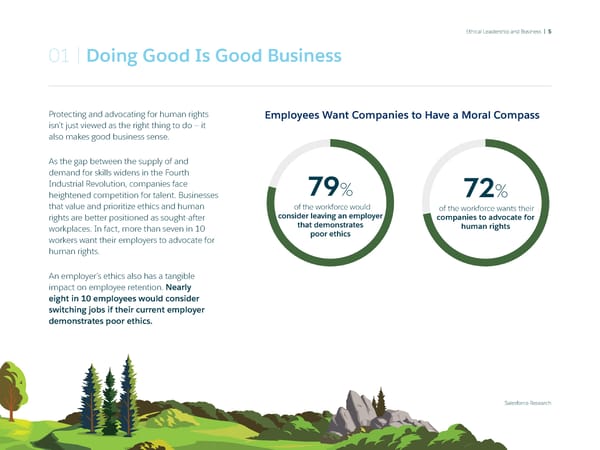

Ethical Leadership and Business | 6 01 | Doing Good Is Good Business This dynamic extends beyond a company’s Consumers Are Drawn to Companies That Stand for workforce. Consumers are more likely to Human Rights support brands that positively impact society. In fact, more than two-thirds of consumers want the companies they buy from to advocate for human rights. The intersection of human rights and consumer behavior is of particular concern for historically disenfranchised groups. While 69% 65% of men want the companies they work for to advocate for human rights, even more of consumers women – 78% – share this belief. Similarly, want the companies they 79% of underrepresented minorities want buy from to advocate for their employers to advocate for human rights, human rights compared to 69% of Caucasians. SalesforSalesforcce Re Researesearchch
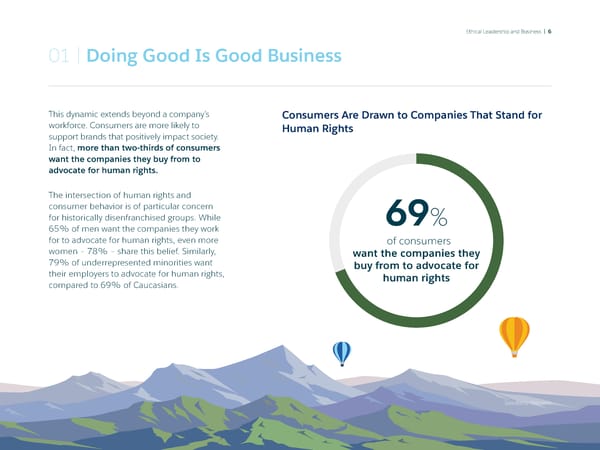

Ethical Leadership and Business | 7 01 | Doing Good Is Good Business Ethics is core to customer loyalty. In Good Ethics Leads to Brand Loyalty fact, 86% of consumers say they would be more loyal to and 69% say they would Percentage of Consumers Who Agree with the Following spend more money with a company that I would be more loyal to a company that demonstrates good ethics demonstrates good ethics. 86% There are noteworthy differences in how I would consider not buying from a company that demonstrates poor ethics generations view this topic. For example, 87% 75% of millennials would spend more money with companies that demonstrate good ethics, I would spend more money with a company that demonstrates good ethics compared to 61% of baby boomers and 69% traditionalists. As younger generations increase their buying power, it will become more important for companies to be values-driven. If acting responsibly makes good business sense, acting irresponsibly has the opposite effect. Seventy-five percent of consumers would consider not buying from a company that demonstrates poor ethics. SalesforSalesforcce Re Researesearchch
Ethical Leadership and Business | 8 02 | Emerging Technology Pushes Ethics to the Forefront Machine learning, AI, and autonomous vehicles — among other emerging technologies — are no longer futuristic concepts. Instead, most people are actively witnessing their impacts on the world around them. Sixty- nine percent of consumers believe that emerging technologies are 52% of consumers say they’re more fundamentally changing how they live. worried about technology’s ethical issues . But perceptions of these emerging technologies aren’t universally positive than they were a year ago — nearly six in 10 say some emerging technologies are harming society. More than 90% of consumers list privacy threats, data leaks, misinformation, and surveillance as top concerns. Consumers Express Anxiety About the Potential Impact of Emerging Technologies Percentage of Consumers with Concerns That Emerging Technology Could Lead to the Following Privacy threats/ 97% data leaks Misinformation 93% 59% Surveillance 91% of consumers say some emerging technologies Job losses 88% are harming society Threats to 85% democracy Environmental 83% damage Increased/widened 77% inequality Includes answers of “very concerned” and “somewhat concerned.” Salesforce Research
Ethical Leadership and Business | 9 02 | Emerging Technology Pushes Ethics to the Forefront While consumers are concerned about its Technology Is Largely Viewed as Neither Inherently potential pitfalls, they generally see emerging Good Nor Bad technology, itself, as neutral. In fact, two- thirds of consumers believe that technology is neither inherently good nor bad — how it’s used matters more. This leaves business at a crossroads. Tech companies are tasked with creating and deploying 67% products and services that take into account their societal impact, and other companies are tasked of consumers believe with ensuring their use of those technologies is technology is neither constructive, rather than destructive. inherently good nor bad — how it’s used is what matters 70% of consumers believe companies should have ethics advisory boards to help support the development of their tech products. SalesforSalesforcce Re Researesearchch
Ethical Leadership and Business | 10 02 | Emerging Technology Pushes Ethics to the Forefront Despite some reservations, the overwhelming Technology Can Improve Lives majority (81%) of consumers believe that emerging technologies can make the world Percentage of Consumers Who Agree with the Following a better place. Emerging technologies have the potential to make the world a better place Indeed, there are plenty of reasons for 81% optimism when it comes to the impact of Emerging technologies have the potential to make my life better emerging technologies on big societal issues. 78% AI, for example, is modernizing energy 78% grids, and 3-D printing is lowering the cost of prosthetic limbs. It’s not surprising that more than three-quarters of consumers think emerging technology can make their own lives better. SalesforSalesforcce Re Researesearchch
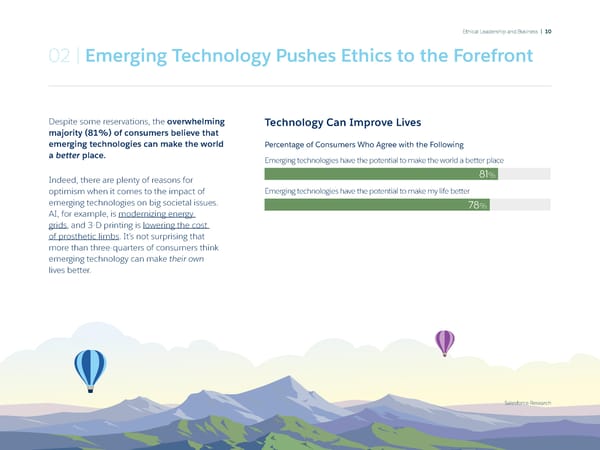

This is a modal window.
Ethical Leadership and Business | 11 03 | New Opportunities Arise for Companies to Make a Difference Having a diverse range of voices at the table Consumers Want a Say in Technology Development is paramount as companies continue to consider their impact on society. For example, Percentage of Consumers Who Say the Following Groups Should Be Engaged with the rising focus on ethics, nearly half of Throughout the Technology Product Lifecycle consumers say they want advocacy and human rights groups engaged throughout Everyday consumers the technology product lifecycle. 81% People also want their own voices heard during Advocacy and human rights groups technology development. An overwhelming 47% 81% want everyday consumers to be Academics engaged throughout the technology 44% product lifecycle, but only one-third believe people like them are actively involved. Lawmakers or government agencies 37% This type of engagement has a business impact by helping companies better understand their customers. While only 45% of consumers believe technology products are developed with their needs in mind, 65% believe that including diverse perspectives in technology 65% development yields better products. of consumers believe diverse perspectives in technology development yields better products Salesforce Research
Ethical Leadership and Business | 12 03 | New Opportunities Arise for Companies to Make a Difference Many consumers are worried about Consumers Worry About Unequal Access unequal access to opportunity in the Fourth to Tech-Associated Opportunities Industrial Revolution — particularly for those who traditionally have been marginalized Percentage of Consumers Who Are Concerned About Access to Technology’s or disenfranchised. Opportunities Among the Following Groups At least two-thirds of consumers indicate People with disabilities some level of concern about whether 86% people with disabilities, of low socio- economic status, in rural locations, and People of low socio-economic status underrepresented minorities — among 85% other groups — are being afforded the People in rural locations same opportunities from emerging 81% technologies as others. Underrepresented minorities As with human rights, these concerns 80% are more common among historically Women disenfranchised groups. Seventy-three percent of women, for example, are 73% concerned about their own access to Myself emerging technology opportunities, 67% compared to 60% of men. For underrepresented minorities, that figure People in urban locations jumps to 81%, compared to 60% 67% of Caucasians. Includes answers of “very concerned” and “somewhat concerned.” Salesforce Research
Ethical Leadership and Business | 13 03 | New Opportunities Arise for Companies to Make a Difference Businesses have an opportunity to ensure fair Consumers Seek Nontraditional Pathways to Bridge and equal access to the benefits of emerging Access Gap technologies. While less than half of consumers believe that jobs in the tech industry are fairly accessible to all groups, they point to alternative pathways as a way to bridge the access gap. More than three-quarters of consumers think there should be more non- traditional paths to technology careers. 76% These can include workforce development and apprenticeship programs that serve of consumers believe underrepresented communities with programs there should be more that develop the skills to succeed. nontraditional paths to technology careers Salesforce Research
Ethical Leadership and Business | 14 03 | New Opportunities Arise for Companies to Make a Difference Today, 88% of consumers are concerned with Consumers Look to Companies to Help Prepare job loss prompted by emerging technologies, Tomorrow’s Workforce and nearly all — 96% — believe companies have a responsibility to prepare their existing workforce for the impact of emerging technologies on jobs. 92% 96% Likewise, consumers look to companies to skill and train future generations. As the of consumers believe of consumers believe role of business expands, equal access to companies have a companies have a the opportunities afforded by current and responsibility to prepare responsibility to prepare future technologies is viewed as an important young people for their existing workforce for emerging technology’s emerging technology’s commitment to humanity. impact on jobs impact on jobs SalesforSalesforcce Re Researesearchch
Ethical Leadership and Business | 15 Ethical Leadership and Business | 15 Last Look Four Ways Companies Can Lead and Impact Society As we enter a new era of technology, consumers see a mandate for ethical leadership and business. Here are steps that companies can take to adapt to their changing role in society, strengthen customer loyalty, attract and retain top talent, and empower the workforce of the future. 1. Put Purpose at the Center of Your Business 3. Diversify Technology Development Increasingly, people expect companies to use their power for Consumers want to be part of the technology product lifecycle positive change — 93% of consumers say companies have and have their voices heard. Diverse voices help create products a responsibility to look beyond profit and exert a positive and solutions that are ultimately better suited to the broader impact on society. Companies can start by asking how their population needs. Sixty-five percent of consumers believe actions impact all stakeholders. that diverse perspectives in technology development result in better products. Businesses can do this by creating diverse 2. Cultivate an Ethical Mindset and inclusive workforces. Companies that lead with ethics are more appealing to potential employees and customers. Eighty-six percent of 4. Empower the Future Workforce consumers say they would be more loyal to companies that As technology progresses, 92% of consumers believe that demonstrate better ethics. One way companies can show a companies have a responsibility to prepare young people for commitment to ethics is by assembling a diverse advisory board the impact of emerging technologies on jobs — and 96% say for input and accountability. Seventy percent of consumers the same for the existing workforce. Companies can empower believe companies should have ethics advisory boards to help everyone for careers in a technology-driven world through support the development of their tech products. workforce development initiatives. Seventy-six percent of consumers believe there should be more nontraditional paths to technology careers. SalesforSalesforcce Re Researesearchch
Ethical Leadership and Business | 16 Survey Demographics U.S. REGION GENDER South........................................................................................................38% Male.........................................................................................................50% Northeast...............................................................................................23% Female....................................................................................................50% Midwest..................................................................................................21% Other.......................................................................................................<1% West.........................................................................................................18% EMPLOYMENT STATUS GENERATION Employed full-time (30+ hours per week).........................................42% Baby boomers/Traditionalists (born 1964 or earlier)................... 42% Employed part-time (<30 hours per week).......................................13% Gen X (born 1965–1980).........................................................................26% Retired....................................................................................................25% Millennials (born 1981–1994)...............................................................25% Unemployed.........................................................................................18% Gen Z (born 1995 or later)...........................................................................7% Full-time student...................................................................................4% ETHNICITY* HIGHEST EDUCATION COMPLETED White (not Latino or Hispanic)..................................................................70% Less than high school...........................................................................2% Black..........................................................................................................16% High school diploma..........................................................................39% Hispanic or Latino..................................................................................9% Associate’s degree...............................................................................19% Asian or Indian........................................................................................7% Bachelor’s degree................................................................................27% Native American or Alaska Native...................................................2% Masters, doctoral, or professional degree................................13% Native Hawaiian or Pacific Islander.............................................<1% Two or more ethnicities.......................................................................4% Undisclosed...........................................................................................<1% * Multiple responses allowed. Salesforce Research
Ethical Leadership and Business | 17 Ethical Leadership and Business | 17 Additional Resources Learn how Salesforce is Get insights on how consumers committed to the ethical and view the intersection of humane use of technology. business and equality. LEARN MORE GET THE REPORT SalesforSalesforcce Re Researesearchch
